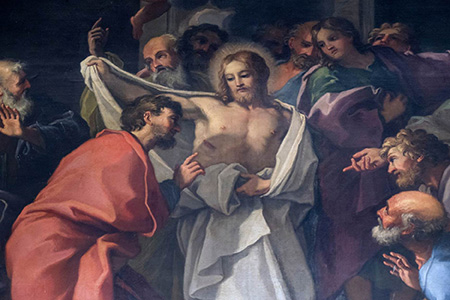It was the evening of the first Easter Sunday, the “first day after the Sabbath” (Jn 20:19). Jesus’ disciples are behind locked doors for fear of the Jews; he appears amongst them and greets them with a traditional Hebrew greeting “Peace be with you” (19). Jesus shows them “his hands and his side” (20); he is raised with the same body that was crucified and died only days earlier. He carries these marks of his earthly sacrifice with him when he ascends into heaven (Ref. Ignatius Catholic Study Bible P 199). Then Jesus breathes on them and said to them “Receive the Holy Spirit”, in anticipation of the coming of the Holy Spirit on Pentecost (Ref Acts 2:1-4, ICSB P199). Jesus also reiterates their power to “forgive” and “retain” sins (23) although the authority to “bind” and “loose” sins has already been conferred upon Peter and the disciples (Ref. Mt 16:19, 18:18). With these witnesses of his resurrection empowered, Jesus’ Church is ready for action!
This Sunday’s Gospel reading includes an account of the story of doubting Thomas. It is the second Sunday of the Easter octave, “eight days later” after Jesus is risen (26). The scenario is similar to Jesus’ first appearance to the disciples the Sunday before: they gather behind locked doors, Jesus comes into their midst, and greets them “Peace be with you” (26). Jesus invites Thomas to put his hand “into [his] side” and “be a believer” (27). Thomas is not there when Jesus first comes and he declares that he would not believe that Jesus has risen until he can “put [his] hand in [Jesus’] side” (25). Jesus’ invitation prompts Thomas to immediately make a confession of faith to Jesus, “You are my Lord and my God” (28). Jesus said to these witnesses of his resurrection, “You believe because you see me … Blessed are those who have not seen and yet believe” (29).
In the first reading, we hear that the first converts devote themselves to the Apostle’s “teaching and fellowship, to the breaking of the bread and prayers”; and the Apostles perform “many wonders and signs” (Acts 2:42-43). The believers are united as a family; together they learn, live, eat, worship and pray. The temple continues to be a venue for prayer and preaching (Ref 42, 46, ICSB P 212). They praise God and win the people’s favour; there is a day on which some 3,000 persons are baptized (Ref 41). The early Church has undergone rapid growth, “the Lord added to their number day by day those who were being saved” (47). The earliest Church is off to a great start!
In the second reading, we hear from St. Peter’s pastoral letter written to encourage young churches perplexed by growing hostility towards Christians in the northern provinces of Asia Minor. With persecution rising, the danger of being a Christian in an unbelieving world were being felt more and more acutely (ICSB P 448). St. Peter counsels the faithful that Jesus’ resurrection from the dead gives them a spiritual rebirth by grace, being “born anew” into the family of God in a supernatural way that gives them a share of his own divine life (1 Peter 1:3); it is their privilege to invoke God as “father” and to await heaven as their inheritance (17, 4; Ref. ICSB P 451). Sufferings are the tests of faith by fire and St. Peter encourages the faithful to look beyond these trials to the “praise, glory and honour” (7) and “salvation” (9) that await them “when Jesus Christ appears” (9; Ref. ICSB P 451). Let’s be encouraged that those who “have not yet seen him and yet … love him … believe in him and experience a heavenly joy beyond all words”, the outcome of our faith will be salvation (8, Ref. 9). Thanks be to God! Alleluia!
